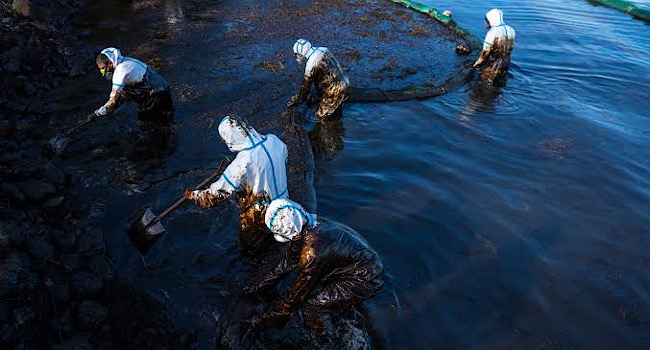Politics
UK court approves lawsuit against Shell by Nigerian farmers over oil spills

The UK Supreme Court on Friday, February 12, granted permission to a group of 42,500 Nigerian farmers and fishermen to sue Royal Dutch Shell (RDS) in English courts after years of oil spills in the Niger Delta contaminated land and groundwater.
According to the verdict, senior judges revealed that Shell — one of the world’s biggest energy companies — did have a common law duty to ensure the care of locals and the environment.
The ruling comes almost two years after a similar ruling by the Supreme Court in a case involving mining company Vedanta. The judgment allowed nearly 2,000 Zambian villagers to sue Vedanta in England for alleged pollution in Africa.
That move was seen as a victory for rural communities seeking to hold parent companies accountable for environmental disasters. Vedanta ultimately settled out of court in January 2020.
The Niger-Delta communities of Ogale and Bille alleged their lives and health have suffered because of contamination of the land, swamps, and groundwater as a result of repeated oil spills and that there has been no adequate cleaning or remediation.
Represented by law firm Leigh Day, the farmers argued that Shell owed them a duty of care because it either had significant control of and was responsible for, its subsidiary SPDC. Shell countered that the court had no jurisdiction to try the claims.
“(The ruling) also represents a watershed moment in the accountability of multinational companies. Increasingly impoverished communities are seeking to hold powerful corporate actors to account and this judgment will significantly increase their ability to do so,” Daniel Leader, partner at Leigh Day, said.
SPDC is the operator of oil pipelines in a joint venture between the Nigerian National Petroleum Corporation (NNPC) which holds a 55% stake, Shell which holds 30%, France’s Total with 10%, Italy’s Eni with 5%.
Shell has blamed sabotage for oil spills. It said in its annual report published last March that SPDC, which produces around 1 million barrels of oil per day, saw crude oil spills caused by theft or pipeline sabotage surge by 41% in 2019.
Ripples Nigeria reports this ruling is the second loss for Shell in 2021 regarding claims against its Nigerian operations.
SPDC is the operator of oil pipelines in a joint venture between the Nigerian National Petroleum Corporation (NNPC) which holds a 55% stake, Shell which holds 30%, France’s Total with 10%, Italy’s Eni with 5%.
Shell has blamed sabotage for oil spills. It said in its annual report published last March that SPDC, which produces around 1 million barrels of oil per day, saw crude oil spills caused by theft or pipeline sabotage surge by 41% in 2019.
In a landmark Dutch ruling two weeks ago, an appeals court held Shell responsible for multiple oil pipeline leaks in the Niger Delta and ordered it to pay unspecified damages to farmers, in a victory for environmentalists.
Join the conversation
Support Ripples Nigeria, hold up solutions journalism
Balanced, fearless journalism driven by data comes at huge financial costs.
As a media platform, we hold leadership accountable and will not trade the right to press freedom and free speech for a piece of cake.
If you like what we do, and are ready to uphold solutions journalism, kindly donate to the Ripples Nigeria cause.
Your support would help to ensure that citizens and institutions continue to have free access to credible and reliable information for societal development.
























